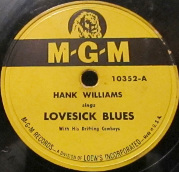"I'll Never Get Out of This World Alive" is a song written by Fred Rose and American country music singer-songwriter Hank Williams, released by Williams in 1952.
"I'm So Lonesome I Could Cry" is a song written and recorded by American country music singer-songwriter Hank Williams in 1949. The song has been covered by a wide range of musicians.

"Lovesick Blues" is a Tin Pan Alley song, composed by Cliff Friend, with lyrics by Irving Mills. It first appeared in the 1922 musical "Oh, Ernest", and was recorded that year by Elsie Clark and Jack Shea. Emmett Miller recorded it in 1925 and 1928, followed by country music singer Rex Griffin in 1939. The recordings by Griffin and Miller inspired Hank Williams to perform the song during his first appearances on the Louisiana Hayride radio show in 1948. Receiving an enthusiastic reception from the audience, Williams decided to record his own version despite initial push back from his producer Fred Rose and his band.

"I Saw the Light" is a country gospel song written by Hank Williams. Williams was inspired to write the song while returning from a concert by a remark his mother made while they were arriving in Montgomery, Alabama. He recorded the song during his first session for MGM Records, and released in September 1948. Williams' version did not enjoy major success during its initial release, but eventually it became one of his most popular songs and the closing number for his live shows. It was soon covered by other acts, and has become a country gospel standard.

"Kaw-Liga" is a country music song written by Hank Williams and Fred Rose.
"Ramblin' Man" is a song written in 1951 by Hank Williams. It was released as the B-side to the 1953 number one hit "Take These Chains from My Heart", as well as to the 1976 re-release of "Why Don't You Love Me". It is also included on the 40 Greatest Hits, a staple of his CD re-released material.
"Honky Tonk Blues" was a hit country and western song written and performed by Hank Williams. The original 1952 recording was a major hit, and it later became a hit for Charley Pride.
"Take These Chains from My Heart" is a song by Hank Williams. It was written by Fred Rose and Hy Heath and was recorded at Williams' final recording session on September 23, 1952, in Nashville. The song has been widely praised; Williams' biographer Colin Escott deems it "perhaps the best song [Rose] ever presented to Hank...It was one of the very few songs that sounded somewhat similar to a Hank Williams song." Williams is backed by Tommy Jackson (fiddle), Don Helms, Chet Atkins, Jack Shook, and Floyd "Lightnin'" Chance (bass). In the wake of Williams' death on New Year's Day, 1953, the song shot to No. 1, his final chart-topping hit for MGM Records. Like "Your Cheatin' Heart," the song's theme of despair, so vividly articulated by Williams' typically impassioned singing, reinforced the image of Hank as a tortured, mythic figure.
"You Win Again" is a 1952 song by Hank Williams. In style, the song is a blues ballad and deals with the singer's despair with his partner. The song has been widely covered, including versions by Ray Charles, Jerry Lee Lewis, Roy Orbison, the Grateful Dead, Charley Pride, Bob Dylan, and the Rolling Stones.
"Honky Tonkin'" is a 1947 country music song, written and recorded by Hank Williams. His song went to #14 on the Billboard country music chart in 1948. In 1982, it became the sixth chart topping single for Williams' son, Hank Williams Jr.
"Lost Highway" is a country music song written and recorded by blind country singer-songwriter Leon Payne in 1948. It was released in October 1948 on Nashville-based Bullet label.

"I Can't Help It (If I'm Still in Love with You)" is a song written and originally recorded by Hank Williams on MGM Records. It hit number two on the Billboard country singles chart in 1951. In his autobiography, George Jones printed the first six lines of the song and stated, "Its lyrics couldn't be more simple - or profound."
"Wedding Bells" is a song written by Claude Boone and recorded by Hank Williams on MGM Records. It peaked at No. 2 on the Best Selling Retail Folk chart in 1949.
"A Mansion on the Hill" is a song written by Hank Williams and Fred Rose and originally recorded by Williams on MGM Records. It peaked at No. 12 on the Most Played Jukebox Folk Records chart in March 1949.
There'll Be No Teardrops Tonight is a song written by Hank Williams and released on MGM Records as the B-side to "Mind Your Own Business" in July 1949.
"You're Gonna Change (Or I'm Gonna Leave)" is a song written by Hank Williams. It was released as a single on MGM Records in September 1949 and reached #4 on the Best Selling Retail Folk Records chart.
"(Last Night) I Heard You Crying in Your Sleep" is a song written and recorded by Hank Williams on MGM Records. It was released as the B-side of "Move It on Over" in 1947.
Six More Miles (To the Graveyard) is a song written by Hank Williams for MGM Records. It appeared as the B-side to "I Saw the Light" in 1948.
"I Could Never Be Ashamed of You" is a song written and recorded by Hank Williams. It was released as the B-side of "I'll Never Get Out of This World Alive" on MGM Records in November 1952.
"Weary Blues from Waitin'" is a song written by Hank Williams. It was released as a posthumous single on MGM Records in 1953.



